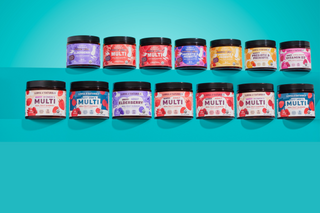Key Points:
- Biotin is one of the essential B vitamins that your child needs.
- Biotin for kids helps to produce energy and maintain the nervous system, and also keeps skin, hair, and nails healthy.
- The best way for your little one to get biotin is from a healthy, whole-food diet.
- However, if your child has food allergies or is a picky eater, they may need a biotin supplement for kids.

Biotin is an essential nutrient that every growing child needs to produce energy and help manage their nervous system. It’s also vital for healthy skin (which is more important than it sounds), and most likely for strong hair and nails too.
Let’s look at what biotin for kids is and why it’s so important that your child gets enough. We’ll also cover how much of this critical nutrient your little one needs and the best places for them to get it, starting with a whole-food diet — the foundation of your child’s health.
What Is Biotin?
Biotin is one of the B vitamins, which include:
- Vitamin B1 (thiamine)
- Vitamin B2 (riboflavin)
- Vitamin B3 (niacin)
- Vitamin B5 (pantothenic acid)
- Vitamin B6 (pyridoxine)
- Vitamin B7 (biotin)
- Vitamin B9 (folate/folic acid)
- Vitamin B12 (methylcobalamin or cyanocobalamin)
Also known as vitamin B7 or vitamin H, biotin is a water-soluble vitamin, dissolving quickly into the water in your child’s body. The body can’t store or make it, so they need to get it regularly from their diet.
Why Your Growing Child Needs Biotin

Biotin helps your little one’s body produce energy. Food is made up of three macronutrients — protein, carbohydrates, and fat. When your child eats a meal, these macronutrients need to be broken down by specific enzymes so the body can use them. Those enzymes need biotin in order to function. For example, protein needs to be broken down into amino acids, which are then used to build muscles, bones, and organs, as well as for energy, among other things.
Biotin is involved in managing cognitive and nervous system function — along with other B vitamins — and there’s some research showing that biotin is likely involved in fetal development and the function of the immune system too.
And although the research is extremely limited, biotin seems to be an essential vitamin for healthy skin — or at least for preventing and treating skin conditions like rashes and dermatitis. Healthy skin not only looks good but also protects the body from germs and bacteria. Biotin is also often promoted as a hair vitamin to help with healthy hair growth, as well as strong and healthy nails.
Symptoms of Biotin Deficiency
It’s unusual in the United States, but if your little one does have a biotin deficiency, you may see some of these symptoms:
- Low energy
- Muscle weakness
- Pink eye
- Skin issues like a dry scalp or a rash around the nose, eyes, and mouth
- Weight loss
- Hair loss
- Brittle nails
- Delayed development
- Hallucinations
- Seizures
If you notice any of these, consult your pediatrician or another healthcare provider. It’s always a good idea to do that anyway before giving your child vitamin supplements, especially if your little one has a medical condition or is on medication of any kind. Your doctor also needs to know if your child is taking biotin, as it can interfere with certain laboratory test results.
Biotin for Kids: How Much They Need

According to the National Institutes of Health, the recommended daily amounts of biotin for kids depends on your child’s age:
- 0-6 months: 5 micrograms (mcg)
- 7-12 months: 6 mcg
- 1-3 years: 8 mcg
- 4-8 years: 12 mcg
- 9-13 years: 20 mcg
- 14-18 years: 25 mcg
There’s no need to worry about the side effects of too much biotin for kids as there’s a very low risk of adverse effects. Because biotin is water-soluble, any extra beyond what your child’s body needs will simply be flushed out and excreted via their urine. If you do notice any kind of allergic reaction though, consult your healthcare practitioner.
How to Boost Biotin for Kids

The best way for kids to get biotin is through their diet.
If you’re breastfeeding, your baby will receive the biotin they need through your breast milk — just make sure you’re getting enough biotin yourself. Otherwise, infant formula also contains biotin, so either way, your baby should be getting enough.
Once your child is eating solid food, if they’re on a healthy diet based mainly around whole foods, they’re probably getting enough biotin. These foods are especially good, plant-based sources of biotin for kids:
- Soybeans
- Nuts, like walnuts, almonds, and pecans
- Oats
- Tomatoes
- Onions
- Mushrooms
- Carrots
- Avocados
- Seeds, like sunflower and sesame
- Bananas
- Strawberries and raspberries
- Sweet potatoes
- Cauliflower
- Broccoli
- Spinach
However, if your child has a food allergy, a gastrointestinal condition that affects nutrient absorption, or is simply a picky eater who won’t eat many of the foods above, you may need to consider a biotin supplement for kids.
Biotin Supplements for Kids

We all need biotin, but children do need less than adults. There are many high-potency biotin supplements out there, offering biotin amounts of 5,000-10,000 mcg, which is far more than a child — or any adult — needs. Rather, look for a dietary supplement containing biotin for kids. These are specifically formulated to meet your little one’s needs.
Biotin for kids comes in many different forms, including tablets, capsules, liquids, or biotin gummies. Be sure to store them safely out of reach of little hands, especially if they taste good.
There are three main choices when it comes to boosting your child’s biotin intake: a pure biotin supplement, a vitamin B complex, or a multivitamin supplement.
It’s unlikely that your little one needs a pure biotin supplement, unless your pediatrician specifically recommends that. High-dose, pure biotin supplements are usually designed for adults and marketed as health or beauty treatments for hair, skin, and nails.
Besides, if your child isn’t getting enough biotin, there’s a good chance they’re not getting enough of several other nutrients too. A vitamin B complex will usually give your child the full spectrum of B vitamins, which can be helpful, but again, these are usually not formulated for children.
Your best option is probably a multivitamin that includes the B vitamins, and sometimes other important nutrients too, like vitamin C, calcium, and/or omega-3s.
For example, Llama Naturals Multivitamin Gummies for Kids contain all the B vitamins, plus vitamin A, vitamin C, vitamin D, vitamin E, and vitamin K1. They’re vegan and made from real fruit, slow-cooked to retain all the nutrients. Llama Naturals gummies are USDA-certified organic, which means they’re non-GMO. They’re also free of added sugar, artificial sweeteners, colors and flavors, gluten, and other common allergens, so you’re getting only the good stuff.
Boost Health and Energy with Biotin for Kids

Biotin is a B vitamin that helps maintain your child’s energy levels and nervous system, as well as healthy skin, hair, and nails. While they only need a few micrograms a day, that small amount is critical for their health.
The body doesn’t store or produce biotin, so your little one needs to get it from their diet. If your child is eating a variety of whole foods, they’re likely getting enough biotin.
However, if they have food allergies or a medical condition that affects food absorption — or they’re simply a picky eater — they may need a kids’ biotin supplement. Make sure you get the best-quality supplement you can afford. After all, your child’s wellness is the foundation for a happy and healthy life — not to mention the ability to run, jump, and swing from jungle gyms.
Llama Naturals is a plant-based nutrition brand that has created the World's First Whole Fruit Gummy Vitamins that are made with no added sugar and whole-food vitamins. They are USDA Organic, Vegan, Gluten Free, free of common allergens, and are slow-cooked on low heat to retain rich phytonutrients & fruit flavor. It’s a win-win gummy vitamin that the whole family will love.

